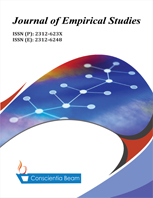Disaggregated Foreign Capital Inflows and Economic Growth in a Developing Economy: Empirical Evidence from Nigeria
DOI:
https://doi.org/10.18488/journal.66.2018.51.1.11Abstract
This study estimates the impact of Foreign Capital Inflows on economic growth in Nigeria from 1986Q1 – 2014Q4. For empirical analysis, the paper adopts the Auto-Regressive Distributed Lag- Unrestricted Error Correction Model (ARDL-UECM). Empirical evidence from the ARDL-bounds Co-integration Test shows there is co-integration between Economic Growth (proxied by Growth rate of Real Gross Domestic Product) and Foreign Capital Inflows (disaggregated into Foreign Direct Investment, Foreign Portfolio Investment and Workers’ Remittances) in Nigeria. The results also show that apart from remittances, other components of Foreign Capital Inflows have significant impact on Economic Growth in Nigeria. The study therefore recommends that Government should, alongside other economic activities, provide an enabling economic environment for more Foreign Capital Inflows. Also the financial sector should be improved so that workers’ remittances can be efficiently tracked through the banking channels and also put to productive use. This is how to minimize the negative impact of workers’ remittance inflows into Nigeria.

